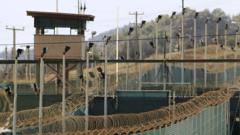The guilty pleas of Khalid Sheikh Mohammed, the alleged mastermind behind the September 11 terror attacks, and two co-defendants have been postponed following an intervention from the U.S. government. Initially set to be accepted on Friday, the pleas were reached under a deal in July that ostensibly offered the defendants immunity from the death penalty. In a surprising turn, the Department of Justice argued to a federal appeals court that accepting these pleas could cause "irreparable harm" to the government.
Amidst this judicial quandary, the court has opted to pause the proceedings to deliberate on the government’s request, without yet deciding on the authority of Defense Secretary Lloyd Austin to overturn the plea agreements, previously sanctioned by a senior official he appointed. This ruling arrives after prior attempts by Austin to dismiss the pleas were rejected by both a military judge and an appellate panel.
The families of the nearly 3,000 victims of the 9/11 attacks have been vocal about the implications of these plea bargains. While some criticized the agreements as overly lenient, viewing them as unacceptable concessions, others saw them as a potential pathway to closure after two decades of legal proceedings. Terry Strada, who lost her husband in the attacks, expressed her discontent with the notion of bargaining with those who committed such grievous acts.
In an official court filing, the government contended that proceeding with the pleas would negate their ability to pursue capital punishment against the accused, individuals linked to one of modern history’s most shocking terrorist incidents. The judge decided that allowing time for a thorough review of the case aims to ensure no parties are hastily denied justice.
Khalid Sheikh Mohammed and his co-defendants have been held at Guantanamo Bay for over 20 years, with pre-trial hearings extending significantly due to ongoing disputes over the legitimacy of evidence collected during their CIA detention, which involved controversial interrogation methods. As families await a resolution, the legal complexities surrounding the case continue to provoke passionate discussions on accountability and the broader implications for justice in America.
Stephan Gerhardt, who also lost a brother during the attacks, voiced a sense of urgency, reflecting on the importance of progressing towards a trial, while highlighting the physical decline of the defendants as they age. As these events unfold, the specter of 9/11 remains a heavy presence in the collective consciousness, serving as a reminder of the tragedy and the pursuit of justice that continues to divide perspectives.




















